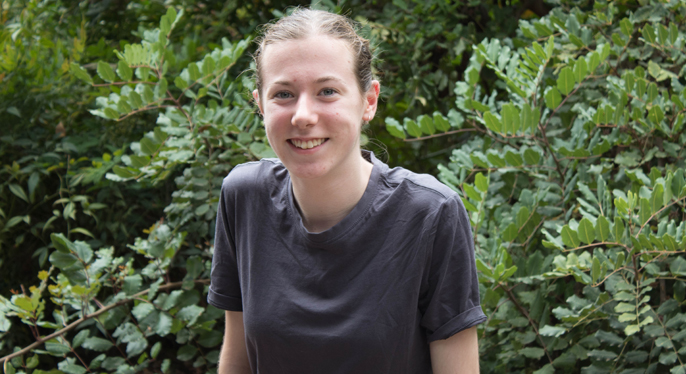Year 12 student, Madeline Lynch, remembers Step-Up as “a big eye-opener”. It showed her aspects of the college she immediately loved, but also daunted her with the prospect of change—the worry that she might not do as well as she hoped, despite her good academic record.
While she had trepidation about starting out at a new campus, Madeline’s memories of her first day are positive ones and she continues to enjoy life at Bendigo Senior.
Madeline came to BSSC from Eaglehawk Secondary College, a school, she says, that allowed her to take advantage of all the opportunities that came her way. She initially wondered if the size of BSSC would make it hard to maintain that momentum.
On reflection, Madeline believes the college has allowed her to adopt a more responsible and mature attitude to her studies—something that has spilled into the rest of her life.
“I used to feel like I was always running on someone else’s timetable,” she explains. “But not anymore.”
The transformation occurred without her feeling that she had been thrown out into the big world unsupported.
“One thing I realised at Step-Up was that I could have lunch down the street with a couple of friends if I wanted to,” she says. “I think I was also ready to meet new people.”
While Madeline says she has encountered a few ‘cliques’ she has generally found the college to have a tolerant culture.
“I’ve really appreciated how easily students mix and I’ve made heaps of great, supportive friends since I came here.”
She admires the way the college supports specific groups, such as the LGBTI community, and feels that BSSC students generally have an awareness of what’s happening in the wider world.
While Madeline’s relaxed and warm demeanour shines through in conversation, she is candid about the serious struggles she’s had with an unusual phobia.
“I have carpophobia,” she explains. “It’s a phobia about wrists and most people think it’s really weird.”
A common and highly unhelpful response Madeline often receives when she tells people about her phobia is for them to do precisely the worst thing they could: hold up their wrists and ask: ‘what, this?’
“I’m actually managing it really well these days,” she says. “I’ve put in heaps of effort and I’ve discovered distraction works very well for me. Like telling myself to think of ten blue things and concentrating just on that task.”
“I’ve also seriously explored the structure and value of wrists. For example, all my artwork depends on my arms and hands working properly.”
Drawing and painting form a huge part of Madeline’s life. As a child, before she could write, she had a passion for drawing stories and dictating the plot to her mum who would get the words down for her.
While she has entered art shows and competitions, Madeline mostly she draws for the pleasure of it. She recently completed her fourth sketch book—and is now well into number five.
With the Coronavirus lockdown, Madeline expects the downtime will involve the very satisfying ‘task’ of filling sketch book number five.
While art is mostly a solitary pursuit, Madeline believes her love of catching up with her friends will be “heavily impacted” by the new regulations.
“Before the pandemic, I just loved hanging out with my friends and having a good laugh,” she says.
Since coronavirus restrictions hit, like everyone else, Madeline is keeping in touch through social media, video chats and texting.
“I’m actually thinking I might experiment with letter-writing. It would be fun to compose the letters, but also decorate them so they feel a bit more special and personal… we’ll see.
“My main concern is the impact the virus could have on my family and friends, particularly those who are more vulnerable due to medical issues or poor immune systems.”
Until the radical changes to education came into effect, Madeline had made a great start to Year 12, including being part of the Communications and Environmental teams on the Student Leadership Team.
“I was kind of roped into SLT by some mates, but I’m glad I was,” she says. “I’ve never been a great team player, but I’ve enjoyed being part of the groups and feel really proud to help others in their vision and work to make positive change in the college.”
In Studio Art, Madeline has poured a great deal of time and effort into her folio. Her focus this year is ‘Contorted anxiety and phobia’, a topic that allows her to translate her struggles through art and communicate her phobia so others can understand.
Her method has been to take photos of hands, arms and shoulders in tense or distorted positions and reproduce them as watercolours.
But her subject load is not only about art. Madeline is also studying Further Maths, English and Classics—and the highlight of her first term in Year 12, Ancient History.
“I just love it,” she says. “I don’t find it hard to remember content and I often talk to my parents about the fascinating topics we explore.
“At present we’re looking at Sparta and Athens and how they transformed from insignificant places to huge polis (or city) states,” she explains. “Sparta’s insularity, brutal discipline and craving for perfection eventually led to its collapse as a significant regional power.”
Choosing subjects she really enjoys has not only kept Madeline engaged and inspired, but given her a widely-focused course. Something that’s important given she’s yet to settle on a career pathway.
“I don’t want to rush myself into a course I don’t feel excited or passionate about,” she says. “I’ll take a gap year, get my Ps, maybe work and build up a portfolio—travel if it’s possible by then.”
Asked for her ‘hot study tip’ Madeline grins and shakes her head.
“I wish I knew the secret to perfect study techniques.”
She has found writing a ‘help sheet’ and making posters of things that need to be remembered, very useful.
However, for Madeline and her peers, coronavirus has not only reshaped school, but every day life. As well as reflecting on her experiences and approaches to study so far, Madeline is approaching the rest of Year 12 with some trepidation.
“I plan to stick to my usual timetable as best I can, to keep a running log of my classes and the work I need to complete each day.
“Being a master of procrastination I’ll have to learn to push past that and just get the work done.”
Madeline’s parents have long worked from home, in a separate section of the house, so she has the luxury of a quiet space to work in. She is sympathetic to the many others who don’t have such ideal conditions.
“I can imagine that studying from home will be very difficult for many students depending on their home and family situations.”
While face-to-face contact with her teachers has been important to Madeline, she’s confident she can progress in Term 2 with more limited contact.
“I’m more than happy to use emails for feedback, and I think using Google Meets will be good to hear directly from my teachers about work and learning.”
While the pandemic is front and centre for most people, Madeline remains concerned about the many environmental issues being pushed to the background.
“Our species has a habit of taking advantage of the natural environment,” she says. “I feel, as a whole, we don’t fully understand or care enough about the consequences of our actions.
“It’s not just about how it will affect the preservation of the human race—honestly, sometimes I worry we’re too much trouble for this planet!”
Madeline advocates living smartly—asking ourselves whether the items we buy are worth the consequences? How long will it take to break down after I’m finished with it? Will it harm other creatures on the planet? Are there other, less impacting alternatives?
“If everyone aimed to live sustainably and respectfully, our global footprint would greatly reduce,” she says. “Of course, many people don’t have the luxury or resources to do this, but everyone has the capacity to try.”
So who are the people that impress Madeline?
“Everyday people who are trying their best,” she says. “Parents who are doing their best to teach their kids compassion and empathy; who educate them in the importance of being environmentally aware. And young people who stand up and have their say about what they think is right.”
Asked what advice she would offer her 12-year-old self, Madeline would start with, “Be more accepting of yourself.”
“Don’t see everything as either ‘success’ or ‘failure’ and don’t put so much pressure on yourself.
“Many of my friends and adult role models have qualities and morals that I greatly respect and hope to learn from,” she explains. “I envy their confidence in being themselves and their ability to care for others, and make them feel loved and valued.
“Rather than have ‘heroes’, I try to learn from all of these people and use them as references for how I choose to live my life and treat others.”











